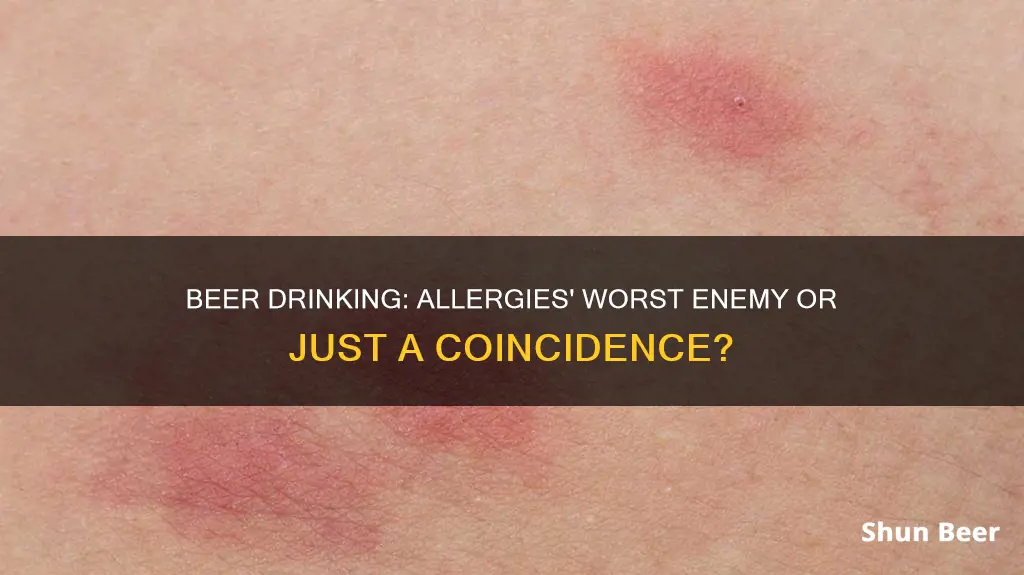
Drinking beer can affect your allergies, but it's important to distinguish between a true beer allergy and an intolerance or sensitivity to beer or its ingredients. True beer allergies are rare, and symptoms can include abdominal pain, bloating, chest tightness, and even anaphylaxis. On the other hand, a beer intolerance or sensitivity is more likely and can cause symptoms such as hives, nausea, vomiting, and abdominal pain. Beer contains ingredients like wheat, yeast, sulfites, and histamine, which are common allergens and can trigger allergic reactions in susceptible individuals. Alcohol intolerance, caused by a genetic condition that affects the body's ability to break down alcohol, can also contribute to adverse reactions when drinking beer.
| Characteristics | Values |
|---|---|
| True beer allergies | Rare |
| Cause of beer allergies | Allergic to a specific ingredient in beer |
| Symptoms of beer allergy | Abdominal pain and bloating, chest tightness, hives, wheezing, itching, swelling, loss of consciousness, anaphylaxis |
| Alcohol intolerance | Genetic condition, not an allergy |
| Alcohol intolerance symptoms | Stuffed nose, skin flushing, facial redness, hives, worsening of asthma, upset stomach, nausea, vomiting, diarrhea |
What You'll Learn

Beer allergies vs. intolerance
While true beer allergies are rare, some people may experience an allergic reaction to beer. If you are allergic to beer, you will likely experience symptoms similar to those of other allergic reactions, including abdominal pain, bloating, and chest tightness. An allergic reaction to beer usually occurs within a couple of hours of consumption, but reactions involving hives, wheezing, and chest pain can happen almost immediately and should be treated as severe and potentially life-threatening.
If you are experiencing very mild symptoms, you may have a food sensitivity or intolerance rather than a true allergy. This can be uncomfortable but is not an immune system response and is, therefore, less serious.
If you feel ill after drinking beer but do not experience symptoms at any other time, you may have an alcohol intolerance. Alcohol intolerance is a genetic condition, not an allergy to beer ingredients, and means that your body cannot break down alcohol effectively. Symptoms of alcohol intolerance can include a stuffy or runny nose and worsening of asthma symptoms. The only way to prevent these uncomfortable reactions is to avoid alcohol.
If you experience symptoms after drinking beer, but not after drinking other alcoholic beverages, it is likely not alcohol intolerance. Instead, you may be allergic or sensitive to a particular ingredient in beer.
Bartenders and Beer: California's Drinking Laws Explained
You may want to see also

Common allergens in beer
Beer allergies are rare, but they can be dangerous. If you experience any symptoms of an allergic reaction after drinking beer, such as abdominal pain, bloating, or chest tightness, you should seek immediate medical attention.
If you have a beer allergy, it is likely that you are allergic to one of its specific ingredients. Beer is primarily made from water, but it also contains other ingredients that are common allergens, including:
- Malted barley: Barley is the main ingredient in most beers, and people with a wheat allergy may also react to barley.
- Wheat: Wheat is another common ingredient in beer, and wheat allergies are increasingly common worldwide.
- Sorghum: A 2014 study found that sensitivity to sorghum or sorghum malt was the most common cause of beer allergies in Chinese participants.
- Gluten: Gluten is a protein found in wheat, rye, and barley. People with a gluten allergy, sensitivity, or celiac disease must follow a gluten-free diet.
- Histamines: Histamines are produced during the fermentation process. People with histamine intolerance cannot prevent histamine from entering the bloodstream and causing symptoms such as gastrointestinal issues.
- Sulfites: Sulfites are in beer after fermentation. A sulfite allergy can cause symptoms such as asthma and allergic rhinitis.
- Yeast: Brewer's yeast is made from a fungus and is found in all fermented alcohol. A yeast allergy can cause hives and digestive symptoms and, in rare cases, serious allergic reactions.
If you suspect you have a beer allergy, it is important to see a doctor or allergist for testing and advice.
Beer Drinking: California Pool Apartments' Rules Explained
You may want to see also

Diagnosing beer allergies
Beer allergies are rare, and you may actually have an intolerance to beer. However, it's important to seek a proper diagnosis to determine if you have a true beer allergy.
If you experience uncomfortable symptoms after drinking beer, there are a few things you can do:
- If your symptoms are mild, try switching to another brand to see if you can drink it without any issues.
- An over-the-counter antihistamine may also help with mild symptoms. Your doctor can prescribe a more powerful antihistamine if your symptoms are severe.
- Get tested for allergies. You can start the process with your family doctor or see an allergist. Ask to be tested for ingredients commonly found in beer, such as wheat, barley, and sorghum. Be sure to note whether you have the same symptoms after eating or drinking other food products.
The best way to determine if you have a beer allergy is to visit an allergist. They can perform specific allergy tests, such as skin prick tests, blood tests, elimination diets, or provocation tests, to diagnose allergies.
During an elimination test, you should avoid beer to see if your symptoms subside. In contrast, a provocation test involves consuming a small amount of beer to see if it triggers a reaction. It is important to never attempt a provocation test on your own. These challenges should be done in a clinical setting.
If you have symptoms of an allergy after drinking beer, you should see your doctor. They can help determine if you're allergic to a specific ingredient in the beer, which will help you avoid that ingredient in other products. Allergy testing of the skin and blood should be able to determine your allergies or at least rule some out.
Your symptoms may also be due to an interaction between beer or alcohol and any medication you're taking. Be sure to tell your doctor if you're taking any medications or supplements.
If you've ever experienced swelling of the tongue or throat, or trouble breathing after drinking beer, you should stop drinking beer until you've seen a doctor.
Beer and Zantac: Is It Safe to Mix?
You may want to see also

Managing beer allergies
True beer allergies are rare, but they can be serious. If you experience any symptoms of an allergic reaction after drinking beer, such as abdominal pain, bloating, or chest tightness, you should seek immediate medical attention.
If you experience mild symptoms, such as a rash, itching, or gastrointestinal issues, you may have a food sensitivity or alcohol intolerance rather than a true allergy. Alcohol intolerance is caused by a genetic condition that prevents the body from breaking down alcohol efficiently.
If you suspect you have a beer allergy or intolerance, there are several steps you can take to manage it:
- See a healthcare provider: A doctor can help determine if you have a true allergy or intolerance and identify the specific ingredient in beer that is causing your symptoms. They may perform allergy testing, such as skin or blood tests, to confirm the diagnosis.
- Keep a food and symptom diary: Tracking your symptoms and the types of beer you drink can help identify patterns and pinpoint the ingredient(s) causing your symptoms.
- Try an elimination diet: Under medical supervision, you can cut out beer or specific ingredients from your diet and then reintroduce them to see if your symptoms return.
- Try alternative beverages: If you are allergic or intolerant to a specific ingredient in beer, you may be able to enjoy alternative options, such as gluten-free beer.
- Read labels carefully: Beer ingredients vary by brand, so always check the label to avoid the specific ingredient(s) that trigger your symptoms.
- Take over-the-counter antihistamines: For mild symptoms, antihistamines may help provide relief. For severe symptoms, your doctor can prescribe stronger antihistamines.
- Carry an epinephrine auto-injector: If you have experienced anaphylaxis after drinking beer, your doctor may recommend carrying an epinephrine pen to treat future severe allergic reactions.
- Avoid beer or specific ingredients: The best way to prevent allergic reactions is to avoid drinking beer or carefully read labels to avoid specific ingredients that trigger your symptoms.
Raw Vegans and Beer: What's the Verdict?
You may want to see also

Beer allergies and asthma
Beer allergies are rare, but they can be dangerous. Beer is mostly water, but it contains other ingredients that can cause allergies, such as wheat, barley, yeast, gluten, histamines, and sulfites. If you have a beer allergy, you will likely experience symptoms similar to other allergic reactions, including abdominal pain, chest tightness, and hives. These symptoms can be severe and life-threatening, so immediate medical attention is necessary.
Beer allergy symptoms may start soon after consuming beer or may take a little longer to appear. In some cases, a severe allergic reaction called anaphylaxis can occur, which includes symptoms such as hives, swelling, chest tightness, shortness of breath, and even loss of consciousness. Anaphylaxis is a medical emergency that requires immediate treatment.
If you experience discomfort after drinking beer, it could be due to an allergy or intolerance to a specific ingredient in the beer rather than an allergy to beer itself. Alcohol intolerance, for example, is caused by a genetic condition that prevents the body from breaking down alcohol efficiently, leading to symptoms such as a stuffy nose and skin flushing.
People with asthma are at an increased risk of developing allergies, including beer allergies. Additionally, certain ingredients in beer, such as histamines and sulfites, can worsen asthma symptoms. If you have asthma and experience increased symptoms after drinking beer, it is important to identify the specific trigger to manage your condition effectively.
To determine the cause of your symptoms, it is recommended to consult a healthcare provider, who may suggest allergy testing or refer you to an allergist or gastroenterologist. Managing a beer allergy or intolerance typically involves avoiding beer or choosing beers that do not contain the specific ingredient causing the symptoms.
Cool Hand Luke: Beer or Not?
You may want to see also
Frequently asked questions
If you are allergic to beer, you may experience symptoms such as abdominal pain and bloating, chest tightness, hives, wheezing, and itching. In more severe cases, an allergic reaction to beer can lead to anaphylaxis, which includes symptoms like swelling, a weak or rapid pulse, fainting, and loss of consciousness.
Beer allergies are typically caused by an allergy to one of the ingredients in beer, such as wheat, yeast, gluten, hops, barley, or preservatives. True beer allergies are rare, and you may instead have a food sensitivity or alcohol intolerance.
The only way to completely prevent a beer allergy reaction is to avoid drinking beer. If you are allergic to a specific ingredient in beer, you may be able to drink beers that do not contain that ingredient, such as gluten-free beer. It is important to see a doctor if you suspect you have a beer allergy to determine the specific cause and how to manage it.







